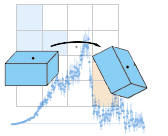
| HOME | PEOPLE | RESEARCH | ACADEMICS | TRAVEL/VISITORS | LINKS | CONTACT |

|
Web Mail
Mailing Lists
Computing Resources
Site Map
CDS Senior Thesis Presentations
Kelly Littlepage (mentor: Jaksa Cvitanic) and Glenn Wagner (mentor: Joel Burdick)
Thursday, June 11, 20092:30 PM to 4:00 PM
114 Steele (CDS LIbrary)
We have three seniors graduating this year who will be getting a minor in Control and Dynamical Systems. Two of them will make presentations of their senior thesis results.
--------
Optimal Portfolios in Discrete Time with Asymmetric Transaction Costs
Kelly Littlepage (mentor: Jaksa Cvitanic)
In this paper we address the question of optimal portfolio management for a hyperbolic absolute risk adverse investor who seeks to maximize his terminal portfolio worth. We assume that portfolio rebalancing operations are conducted in discrete time (of arbitrary period), and that all transactions are sub ject to a fee. In particular we allow for both short selling and borrowing, with asymmetric concave transaction costs. We numerically derive the no-transaction region under a Cox-Ross-Rubinstein model for a variety of transaction cost structures and coefficients of risk aversion. We also use a discretized stochastic volatility model with jumps and stochastic drift to demonstrate how a similar maximization can be performed on more general models using Monte Carlo. We conclude with a discussion of optimum portfolios for general price processes with and without a Markovian structure.
--------
Localization and Sensing with Non-Cooperative Intelligent Actors
Glenn Wagner (mentor: Joel Burdick)
Much effort has been put into making robots more intelligent and more capable of sensing their surroundings. However, they generally ignore other intelligent actors in the environment such as humans, animals, and human controlled vehicles. These actors often have sensors and processing algorithms better for day to day tasks than current robots. Being independent of the robot, they may have different fields of view. Gathering information about the world from these actors is difficult because they are non-cooperative, in that they do not deliberately broadcast information to the robot. Two methods of incorporating data to enhance the robot's sensing are explored in this paper. State space weighting consists of generating a prior probability function over the actors state space based on a prior knowledge of its behavior. Feature detection detects patterns in the state space tra jectory of the actor that are indicative of certain responses to environmental stimuli.
|
©2003-2011 California Institute of Technology. All Rights Reserved webmaster |
|